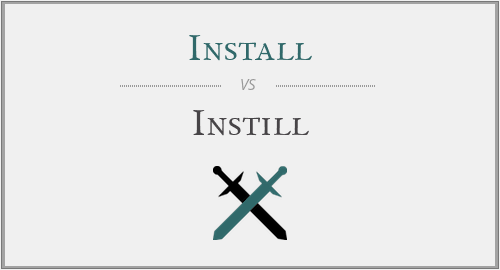The spellings of “install” and “instill” are so similar, distinct due to one letter only, that mistaking them can actually be not mandatory, but simply a typing error that you didn’t even observe. They sound quite differently, so confusing them mainly owes to not knowing their definitions rather than pronouncing them identically. Plus, people usually know what “install” means, but “instill” is less common, and so it might be confusing why both forms are considered correct. Or, even worse, some might believe they have the same meanings and are simply different spellings of the same concept.
“Install” and “instill” are distinct both regarding their spellings and significations, and we will make everything clear for you about these two, in a minute.
Install vs. Instill
“Install” and “instill” are both US spellings, and UK prefers them as “instal” and “instil”. It’s one of the rare situations when British English prefers the shorter form and American English goes for the longer.
They are both verbs, but despite their spelling similarities, they are used in different contexts and with distinct significations. “Install” is a technical term, “instill” tends to be more common.
When do we use “install”?
“Install” is used as a verb, usually in technical contexts, and it is used with three different meanings. Firstly, it defines the action of putting a piece of equipment somewhere or assembling it, to make it ready for use. That is the main meaning. When referring to computers, “install” refers to putting a software on a computer and making it work. Secondly, “install” can also refer to giving someone an important, powerful job.
Example 1: I need to install the new alarm to my apartment, but I have no idea how. – “install” refers to putting a piece of equipment in its right place in order to be functional and ready for use.
Example 2: Can you help me install the new program on my computer? – when referring to computers, “install” refers to setting up a software or program to make it work.
Example 3: The CEO will install me as a Managing Director in two months, if things keep evolving the same way. – “install” can also refer to offering someone an important and powerful job.
When do we use “instill”?
Even though it’s not frequently used, “instill” is can actually be used in more common contexts or situations than “install”. The word refers to making someone have a particular idea or feel something particular.
Example: Our HR manager does a great job, he will always instill confidence and productivity among his team members. – “instill” refers to making a person or a group of people have a particular feeling.
Conclusion
“Install” and “instill” are both correct, usual words in the English vocabulary. To make sure they never confuse you, just keep in mind that “install” refers to placing a piece of equipment somewhere or setting up a software in order to make something function, while “instill” refers to inspiring, making someone get a particular idea or feeling.





Have a discussion about this article with the community:
Report Comment
We're doing our best to make sure our content is useful, accurate and safe.
If by any chance you spot an inappropriate comment while navigating through our website please use this form to let us know, and we'll take care of it shortly.
Attachment
You need to be logged in to favorite.
Log In